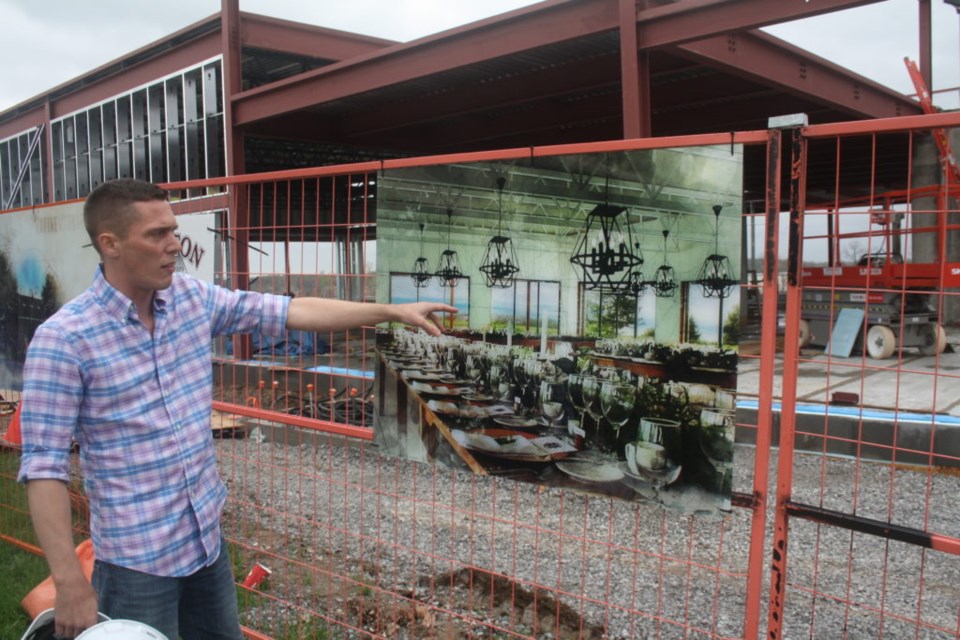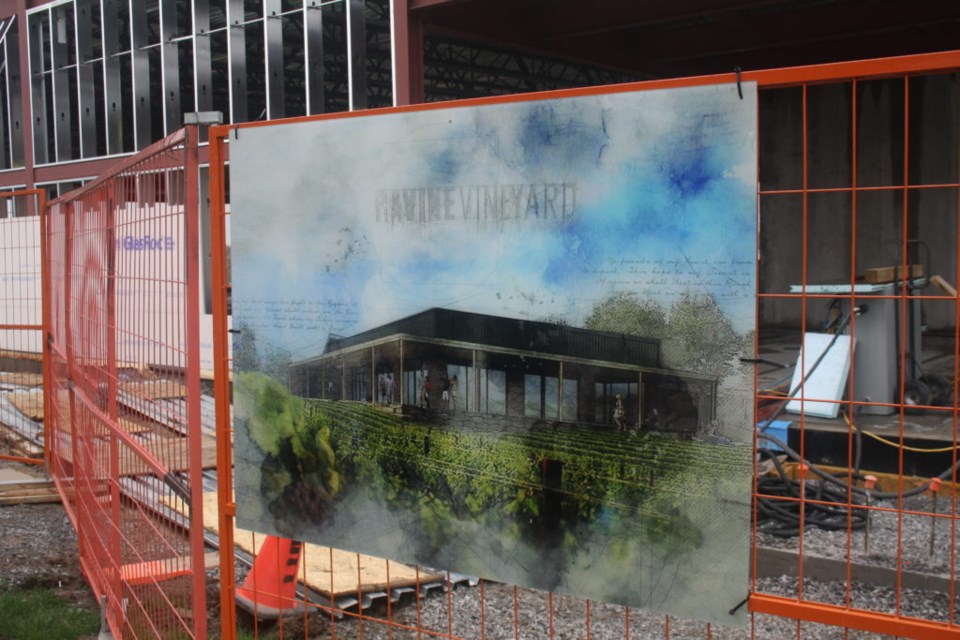
Set back — way, way back — from York Road in St. Davids, there is a large construction site of steel girders, sitting incongruously amongst the backdrop of gently rolling hills of grapevines.
The project is a large, enclosed conference centre, planned to ensure the future of Ravine Vineyard Estate Winery. The hope is that the business it attracts will protect the 32 acres within the urban boundary of the village from development, and will allow the next generation to continue to farm the land.
Forty-year-old Paul Harber is the frontman for the family-owned winery, although his parents, Norma Jane and Blair Harber, continue to be very much involved. Blair stops in at the end of every business day on his way home from his Fort Erie manufacturing operation, and Norma Jane is at the winery every day, says Paul, always making sure everything looks as it should — the perfect combination of rustic elegance.
Paul talks of the long family history of the land that goes back to his great-great grandfather, David Jackson Lowrey, who established a family farm on the property in 1867.
It has been passed down through successive generations. His grandfather, Howard Borden Lowrey, operated the farm from the early 1950s until 2001, during which time most of the fruit orchards were removed and replaced with grapes.
In 2004, Blair and Norma Jane purchased the property from her siblings and her mother, and started replanting new vineyards.
But the land is inside the St. Davids urban boundary, and was slated by the Town for commercial and residential land use. There was pressure to develop it to recoup some of the cost of the new sewer system, said Paul. “The Town wanted the tax dollars. This was never supposed to be winery, it was supposed to be a subdivision.”
Instead the family forged ahead, planting grapes and fulfilling their plans for the winery they hoped would ensure the financial sustainability of the family farm for future generations.
“If it wasn’t for the four generations that came before us,” he said, “and the pride we have for the family farm, it would be hard to do what we’re doing.”
This new construction has always been part of the original plan, and although it wasn’t foreseen to be undertaken quite so soon, it has become evident the $4-million investment is a necessary part of that sustainability.
In recent discussions about the Town’s Official Plan it was revealed only 50 per cent of Niagara wineries are making a profit. The Harber family wants to ensure Ravine does not fall into that category, now or in the future.
According to Town bylaws, wineries are only allowed to hold 24 outside, under-a-tent events a year, most often wedding receptions, which bring in much-needed revenue.
The restriction is to ensure neighbours aren’t unduly bothered by noise, and the limit allows for two events 12 weeks of the year, which aligns with the weather for outdoor events.
Ravine’s new project, an enclosed conference centre, means it doesn’t have to live within those boundaries.
And the dream far exceeds the boundaries of a tent.
There are two full floors to the building, 4,000 square feet above ground, overlooking vineyards, with large windows facing the vineyards and a wrap-around porch to extend the space. There will be a similar-sized basement with a huge kitchen, storage areas, and underground corridors to the existing buildings — the historic packing barn that was rebuilt as a restaurant, after being torched by an arsonist, and the house that was built in 1802, burned in the War of 1812, rebuilt in 1814, moved in 1969, taken apart, stored and moved again in pieces until it was rebuilt again onsite as the retail centre.
There will be more outdoor space in the summer, and a skating rink in the winter, he said.
Paul speaks with excitement of a business conference Ravine has already attracted — Singularity, from Silicon Valley, owned by Google and NASA. The conference filled two Vintage Hotels last year but held meetings at the winery, with plans to return. It has its own university, taking just 30 to 60 students a year with unimaginably high qualifications — being a world leader or inventing technology that will change the world might get you in—and the technology they are working on exceeds what most of us can imagine, he said.
“They stumbled upon us, I’m not sure how. But it was a great shot in the arm, giving us the ability to extend our season. We have 142 employees in the summer, and we want to see 142 employees — or more — on our payroll all year long.”
He said for financial reasons it would have been advantageous to wait another year before beginning the construction project, but “we knew from the beginning we had to do something more than a winery, to create a business that would defend the property from developers. And we’re hoping this will improve relations with the neighbours who have problems with noise.”
Most of the neighbours enjoy having a winery and restaurant in their midst. They come for coffee in the morning, where they can sit and enjoy one of the prettiest and most peaceful views in town, and pick up a loaf of fresh bread while they’re there, along with wine, cider, barbecue or honey mustard sauce, and other products made onsite.
Without a cannery in St. Davids, Ravine is using left-over fruit that would have been processed across the road. The winery makes apple, pear, strawberry and peach cider, returning to family roots with the concept of using up every last bit of fruit.
There are plans for a cold-press juice operation, possibly as a cooperative, says Paul, to ensure unused fruit doesn’t go to waste. Any of the wineries would be able to use the fruit, he explains, but not all are set up to press it.
He is not going to leave any stone unturned in searching out value-added revenue.
“I don’t want to be the generation that puts an end to farming on this property. I don’t like talking about doomsday thoughts, but I can say, ‘over my dead body.’”
